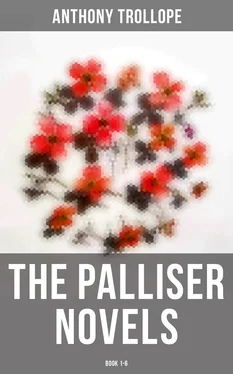He went over to Ireland, staying but one night with Mrs. Bunce, and came down upon them at Killaloe like a god out of the heavens. Even his father was well-nigh overwhelmed by admiration, and his mother and sisters thought themselves only fit to minister to his pleasures. He had learned, if he had learned nothing else, to look as though he were master of the circumstances around him, and was entirely free from internal embarrassment. When his father spoke to him about his legal studies, he did not exactly laugh at his father's ignorance, but he recapitulated to his father so much of Mr. Monk's wisdom at second hand,—showing plainly that it was his business to study the arts of speech and the technicalities of the House, and not to study law,—that his father had nothing further to say. He had become a man of such dimensions that an ordinary father could hardly dare to inquire into his proceedings; and as for an ordinary mother,—such as Mrs. Finn certainly was,—she could do no more than look after her son's linen with awe.
Mary Flood Jones,—the reader I hope will not quite have forgotten Mary Flood Jones,—was in a great tremor when first she met the hero of Loughshane after returning from the honours of his first session. She had been somewhat disappointed because the newspapers had not been full of the speeches he had made in Parliament. And indeed the ladies of the Finn household had all been ill at ease on this head. They could not imagine why Phineas had restrained himself with so much philosophy. But Miss Flood Jones in discussing the matter with the Miss Finns had never expressed the slightest doubt of his capacity or his judgment. And when tidings came,—the tidings came in a letter from Phineas to his father,—that he did not intend to speak that session, because speeches from a young member on his first session were thought to be inexpedient, Miss Flood Jones and the Miss Finns were quite willing to accept the wisdom of this decision, much as they might regret the effect of it. Mary, when she met her hero, hardly dared to look him in the face, but she remembered accurately all the circumstances of her last interview with him. Could it be that he wore that ringlet near his heart? Mary had received from Barbara Finn certain hairs supposed to have come from the head of Phineas, and these she always wore near her own. And moreover, since she had seen Phineas she had refused an offer of marriage from Mr. Elias Bodkin,—had refused it almost ignominiously,—and when doing so had told herself that she would never be false to Phineas Finn.
"We think it so good of you to come to see us again," she said.
"Good to come home to my own people?"
"Of course you might be staying with plenty of grandees if you liked it."
"No, indeed, Mary. It did happen by accident that I had to go to the house of a man whom perhaps you would call a grandee, and to meet grandees there. But it was only for a few days, and I am very glad to be taken in again here, I can assure you."
"You know how very glad we all are to have you."
"Are you glad to see me, Mary?"
"Very glad. Why should I not be glad, and Barbara the dearest friend I have in the world? Of course she talks about you,—and that makes me think of you."
"If you knew, Mary, how often I think about you." Then Mary, who was very happy at hearing such words, and who was walking in to dinner with him at the moment, could not refrain herself from pressing his arm with her little fingers. She knew that Phineas in his position could not marry at once; but she would wait for him,—oh, for ever, if he would only ask her. He of course was a wicked traitor to tell her that he was wont to think of her. But Jove smiles at lovers' perjuries;—and it is well that he should do so, as such perjuries can hardly be avoided altogether in the difficult circumstances of a successful gentleman's life. Phineas was a traitor, of course, but he was almost forced to be a traitor, by the simple fact that Lady Laura Standish was in London, and Mary Flood Jones in Killaloe.
He remained for nearly five months at Killaloe, and I doubt whether his time was altogether well spent. Some of the books recommended to him by Mr. Monk he probably did read, and was often to be found encompassed by blue books. I fear that there was a grain of pretence about his blue books and parliamentary papers, and that in these days he was, in a gentle way, something of an impostor. "You must not be angry with me for not going to you," he said once to Mary's mother when he had declined an invitation to drink tea; "but the fact is that my time is not my own." "Pray don't make any apologies. We are quite aware that we have very little to offer," said Mrs. Flood Jones, who was not altogether happy about Mary, and who perhaps knew more about members of Parliament and blue books than Phineas Finn had supposed. "Mary, you are a fool to think of that man," the mother said to her daughter the next morning. "I don't think of him, mamma; not particularly." "He is no better than anybody else that I can see, and he is beginning to give himself airs," said Mrs. Flood Jones. Mary made no answer; but she went up into her room and swore before a figure of the Virgin that she would be true to Phineas for ever and ever, in spite of her mother, in spite of all the world,—in spite, should it be necessary, even of himself.
About Christmas time there came a discussion between Phineas and his father about money. "I hope you find you get on pretty well," said the doctor, who thought that he had been liberal.
"It's a tight fit," said Phineas,—who was less afraid of his father than he had been when he last discussed these things.
"I had hoped it would have been ample," said the doctor.
"Don't think for a moment, sir, that I am complaining," said Phineas. "I know it is much more than I have a right to expect."
The doctor began to make an inquiry within his own breast as to whether his son had a right to expect anything;—whether the time had not come in which his son should be earning his own bread. "I suppose," he said, after a pause, "there is no chance of your doing anything at the bar now?"
"Not immediately. It is almost impossible to combine the two studies together." Mr. Low himself was aware of that. "But you are not to suppose that I have given the profession up."
"I hope not,—after all the money it has cost us."
"By no means, sir. And all that I am doing now will, I trust, be of assistance to me when I shall come back to work at the law. Of course it is on the cards that I may go into office,—and if so, public business will become my profession."
"And be turned out with the Ministry!"
"Yes; that is true, sir. I must run my chance. If the worst comes to the worst, I hope I might be able to secure some permanent place. I should think that I can hardly fail to do so. But I trust I may never be driven to want it. I thought, however, that we had settled all this before." Then Phineas assumed a look of injured innocence, as though his father was driving him too hard.
"And in the mean time your money has been enough?" said the doctor, after a pause.
"I had intended to ask you to advance me a hundred pounds," said Phineas. "There were expenses to which I was driven on first entering Parliament."
"A hundred pounds."
"If it be inconvenient, sir, I can do without it." He had not as yet paid for his gun, or for that velvet coat in which he had been shooting, or, most probably, for the knickerbockers. He knew he wanted the hundred pounds badly; but he felt ashamed of himself in asking for it. If he were once in office,—though the office were but a sorry junior lordship,—he would repay his father instantly.
"You shall have it, of course," said the doctor; "but do not let the necessity for asking for more hundreds come oftener than you can help." Phineas said that he would not, and then there was no further discourse about money. It need hardly be said that he told his father nothing of that bill which he had endorsed for Laurence Fitzgibbon.
Читать дальше












